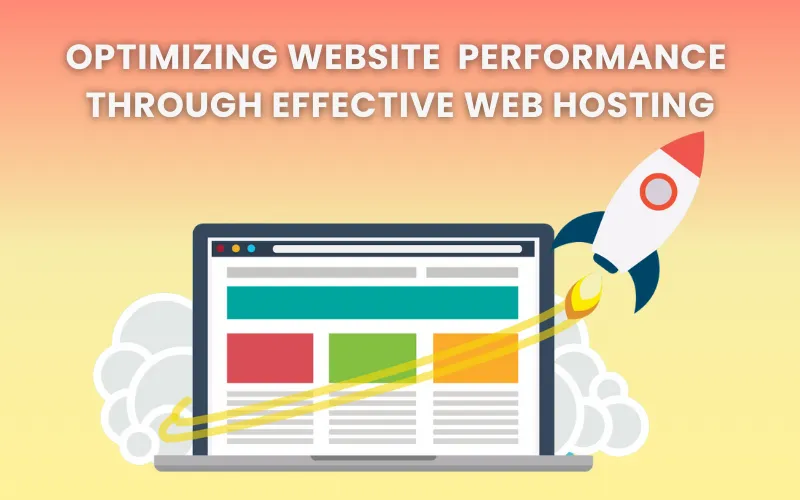How would you feel when you urgently need information, click on a website, and it just… doesn’t load?
You may feel frustrated, impatient, or annoyed because, in those moments, speed matters.
Most of us don’t wait for the site to load. We hit the back button and move on to the next website.
Website speed has a direct impact on user experience and conversion rates. Even a one-second delay in load time can reduce conversions by up to 7% and page views by 11%.
The speed of the website page is also a ranking factor for Google. If your website is slow, users may leave before they even get a chance to explore what you have to offer.
A crucial factor in achieving good website performance is web hosting.
In this article, we’ll understand how web hosting relates to your website speed, compare different hosting types and features, and share practical tips for choosing the right hosting provider.
Understanding The Link Between Web Hosting and Website Speed
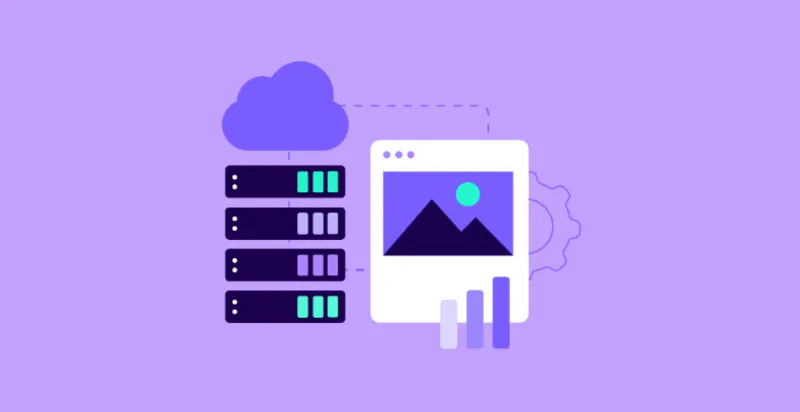
“Hosting is a service you need in order to have a website.” Do you also believe this?
If yes, then let us tell you, hosting is more than that. It directly impacts:
- The user experience
- The brand image
- The security of your website
- The scalability
Your website hosting determines how quickly data is transferred from the server to the visitor. A slow or overcrowded server can lead to frustrating delays, causing users to leave your site and never return. A lagging site can also hurt your ranking factor on Google.
Similarly, reliability is important. Imagine investing a huge amount in a marketing campaign only to have your website crash during peak hours. A reliable hosting provider ensures safety against these potential losses.
In short, your web hosting service is a strategic business decision that influences your website’s success.
With that being said, let us understand how server type, location, and configuration impact the load times.
Server type: Not all servers perform equally. Some are optimized for high performance, while others are designed for basic functionality. If you have a low-tier hosting plan with limited resources, your website will struggle to load quickly.
Server location: The physical distance between your website server and visitors matters. The longer the data has to travel, the more time it takes to load any information.
For example, if someone in India searches for something related to your business, but your server is in the US, then they may experience a longer wait time than is required to get the search result.
Choosing a server closer to your target audience or using a CDN can reduce the search time and load the information quickly.
Server configuration: Features like HTTP/2, PHP 8+, built-in caching, and server-side optimizations can improve the speed of website pages.
And just like the best voice changer tools optimize your sound for clarity and effect, the right server configuration fine-tunes your site for maximum speed and responsiveness.
The above factors decide how fast your website loads.
Consider, for example, you are running an e-commerce site for fashion accessories. You have spent months planning and executing a marketing campaign that goes live during the festive season.
Many users click on your ad but land on a page that shows an error due to a cheap hosting plan. Your buyers are facing problems loading products or while checking out. Due to this, you lose sales and trust of your customers even before you create your brand. This scenario is especially risky for dropshipping websites, where first impressions and seamless transactions are critical.
On the other hand, what if you chose a good hosting plan and hosting provider? Then your website would handle the traffic smoothly, load fast, and give your customers a delightful shopping experience. This would increase your trust and lead to higher conversion rates.
In short, hosting is an important element of a better customer experience and sales performance.
Fast websites convert better, but they also need fast, reliable marketing data. With platforms like Windsor.ai, teams can sync real-time data from 325+ platforms without overloading the website or the dev team.
Now, let’s discuss the hosting options: Shared vs VPS vs Dedicated.
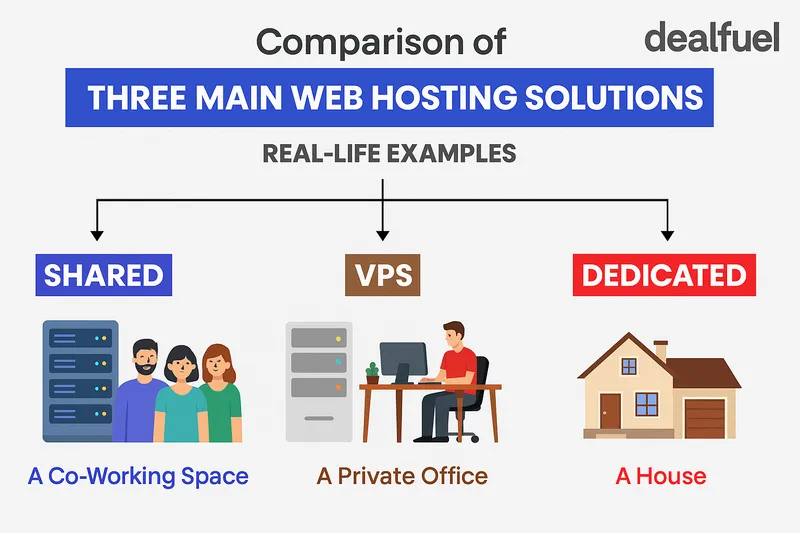
Features | Shared Hosting | VPS Hosting | Dedicated Hosting |
Server resources | Shared with many users | Shared, but virtually isolated | Entire server dedicated to one user |
Performance | Lower, depends on other users | Moderate, more stable than shared | High performance and full control |
Cost | Cheapest | Moderate | Most expensive |
Customization | Very limited | Moderate (root access possible) | Full customization and root access |
Security | Low (affected by other sites) | Better isolation, moderate security | High, controlled by users |
Scalability | Limited | Easily scalable | Can be scaled, but with effort and cost |
Maintenance | Handled by hosting provider | Shared/partial responsibility | Full responsibility of the user |
Ideal for | Small websites, blogs, and beginners | Growing websites, small businesses | Large businesses, high-traffic apps/sites |
Technical Knowledge | Minimal needed | Some required | High (or needs a system admin) |
IP Address | Shared | Usually dedicated | Dedicated |
It is important to choose the right server type and configuration for an improved user experience. If your hosting is not optimized, then even the best-designed website will underperform.
Key Hosting Features That Influence Speed
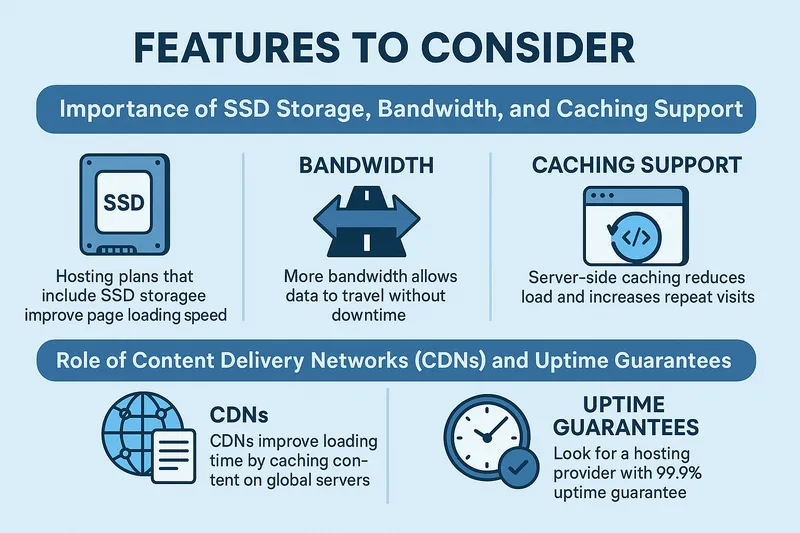
There are many web hosting providers available on the market. Choosing one among them necessitates understanding the core features each of them provides.
Let’s look at the must-have features to consider before choosing a hosting provider.
Importance of SSD Storage, Bandwidth, and Caching Support
- SSD storage: Solid-state drives use flash memory to retrieve the data much faster. Hosting plans that include SSD storage improve page loading speed.
- Bandwidth: It is like a highway that connects your website to its visitors. The wider the highway, the more the data can travel without any downtime. If your hosting plan offers limited bandwidth, your site may lag or crash when there is heavy traffic.
- Caching support: The data for images or code is stored in caching so that your site doesn’t have to reload it from scratch every time. Server-side caching increases the chances of repeat visits and reduces load. Some tools offer built-in caching tools for CMS platforms like WordPress.
Role of Content Delivery Networks (CDNs) and Uptime Guarantees
- CDNs: A CDN is a system that sends copies of your website content to the global servers. This is done because when someone visits your website, the content displayed in their search results is from the content available on the nearest server of your website. The loading time is reduced. CDNs are helpful for websites that have a global audience, like media websites, e-commerce websites, etc.
- Uptime Guarantees: Hosting providers promise 99.9% uptime. But the main concern is that not everyone delivers what they promise. The consistent downtime affects SEO and hurts the trust of users. The provider that can provide an uptime guarantee with real-time monitoring and fast support is important.
These features are crucial for ensuring your website’s consistent performance. Without these, even a well-designed website can feel slow or laggy.
How to Choose the Right Web Hosting Provider for Performance
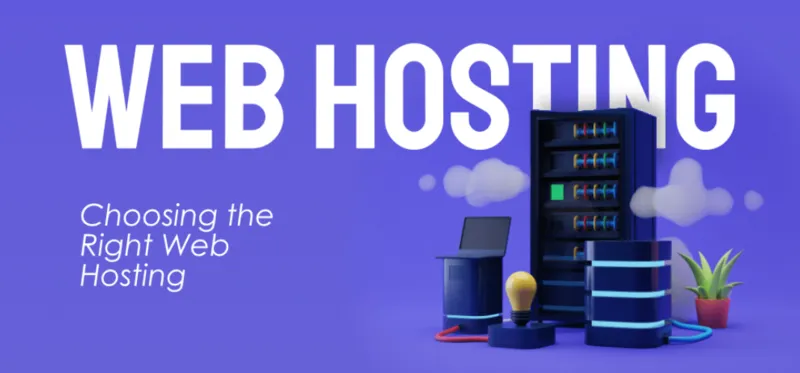
By now, we have understood that every website needs a good hosting plan. Choosing a hosting provider is more than just grabbing the cheapest deal or dealing with the most popular name.
Then, what should you look for when choosing a hosting provider for your website?
The answer to this is to choose a plan that aligns with your website’s current needs.
- Evaluate your current and future traffic needs
Ask yourself, what kind of website am I running?
This becomes a pertinent question while choosing a hosting provider because a simple portfolio or personal blog won’t need the same resources as an online store with many daily visitors.
Consider your current and expected traffic. Are you just starting with minimal visitors? If yes, then a shared or entry-level VPS can be an excellent choice.
But if you expect consistent traffic, plan to run ads, or want to launch campaigns, then you’ll need hosting that does not slow down but performs consistently.
- Look for flexibility to scale without additional costs
Also, look for the flexibility. Some hosting plans may look affordable in the beginning, but they may charge high fees as you upgrade. So, choose a provider that lets you scale up without any worries.
- Review key performance benchmarks
Once you have filtered out hosting providers based on your needs, there are some more components to look for.
To begin with, start reviewing performance benchmarks. Look for reviews or ratings from trusted resources. Check insights like average server response time, page load speed, uptime guarantee, and how well the hosting provider handles the traffic on the website.
These numbers help you understand the reality.
- Test the hosting provider’s support quality
You should also look for their customer support speed. When something goes wrong, an instant and educated support system is required. Look for providers that offer 24/7 support.
The best hosting providers offer speed, uptime, and support.
Don’t Let Slow Hosting Hold You Back
Website speed is a reflection of your brand’s credibility, user experience, and growth potential. Every element of the hosting setup contributes to how fast and reliable your website is.
Choosing the right website provider is a strategic decision. And that’s where Dealfuel will help you.
It offers everything you need for high-performance and reliable hosting. Choose the best fit for your business that is affordable and ensures consistent performance. Dealfuel also offers 24/7 expert support.
Want to make speed your competitive edge? Contact DealFuel today and book a free consultation now. If you have any questions, let us know in the comments below.




